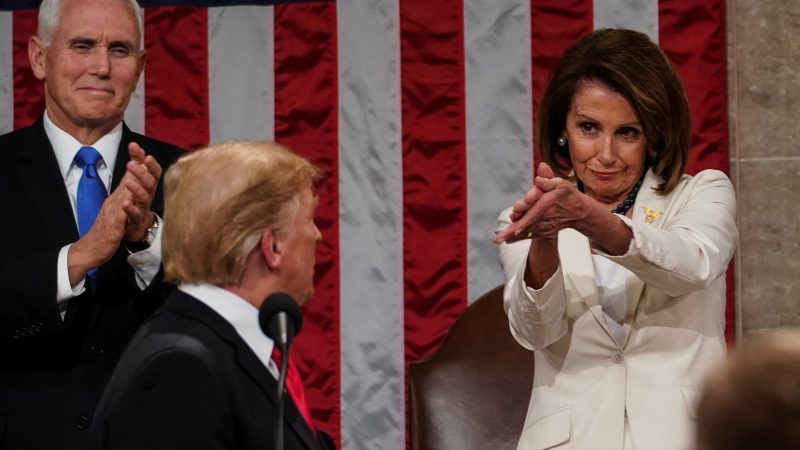Trump's 'Capitulation' on Trade Deal Leaves Republicans in Awkward Position
Will Republicans back a North American trade deal that prioritizes the interests of Democrats, labor unions, and protectionists?

It's the sort of thing that would have been unthinkable just a few years ago: a Republican president essentially handing complete control over a major trade to a Democratic speaker of the House and Democrats' labor union allies.
Yet that's exactly what has happened with the United States–Mexico–Canada Agreement (USMCA), a pact that is intended to replace the 25-year-old North American Free Trade Agreement (NAFTA). The USMCA has been a top priority for President Donald Trump, who struck the deal last year with the leaders of Canada and Mexico. In many ways, the USMCA was already a step backward in terms of free trade—it imposes additional rules on how goods flow across North American borders, aims to harm Mexican manufacturing, and includes a sunset provision that means it could expire without explicit action by future governments. And that was before the Trump administration allowed Speaker of the House Nancy Pelosi (D–Calif.) to make a series of changes to tilt the agreement toward even more protectionism.
During an appearance Sunday on NBC's Meet The Press, Sen. Pat Toomey (R–Pa.) described the USMCA as "a complete capitulation to Pelosi."
Last week, Pelosi announced her support for the USMCA after it incorporated a series of changes—many of them apparently implemented at the request of the AFL-CIO, which also endorsed the trade deal. Those changes include stricter enforcement of labor rules imposed on Mexico, including ramped up inspections of factories and increased authority to stop trucks at the border (and, in a rare moment of the revised pact allowing freer rather than less free trade, the elimination of patent protections for some pharmaceuticals).
Toomey had been an outspoken critic of the USMCA since the deal was first announced last year. Specifically, he has disagreed with provisions that will make it more expensive and difficult for auto companies and other large manufacturers to take advantage of cross-border supply chains.
"Unfortunately, USMCA is an exercise through all kinds of new provisions to diminish trade, and that's why I hope Republicans reconsider this," Toomey said on Sunday. "We have historically recognized we're all better off with more open markets."
Full Toomey: President 'mistaken' on trade deficitshttps://t.co/EwbXsuo4Cs pic.twitter.com/4iERZPXByg
— Meet the Press (@MeetThePress) December 15, 2019
Politically, Trump appears to be betting that giving in to Democrats' wishes will get the USMCA through the House—and that at that point Senate Republicans won't be willing to derail a political victory for the president.
He may very well be right about that.
"There's rumors out there that have lessened Republican enthusiasm for it, but I don't feel like it's going to be big enough to stop us from getting it passed," Senate Finance Committee Chair Chuck Grassley (R–Iowa) told The Wall Street Journal. The Journal also reports that key staffers for Senate Majority Leader Mitch McConnell (R–Ky.) have complained to the White House about how the USMCA has been handled, and Sen. John Cornyn (R–Texas) tells the paper that Trump's bargain with Pelosi is "bad practice" and "a lousy way to treat the Senate."
Mexico is ticked off too. Jesús Seade, Mexico's top trade negotiator, has made an unexpected trip to Washington, D.C., to "express his outrage" over the late-breaking changes to the trade deal, Politico reports.
Long gone, apparently, are the days when even the appearance of working with Democrats would send the conservative grassroots into apoplexy.
Assuming the USMCA clear the House and ends up in front of the Senate (likely not until early 2020), Republicans will have a choice to make. Do they value a political victory for Trump over their own principles? But then, that's been the choice confronting the GOP for a while now, and the result of this next showdown is likely to be the same.


Show Comments (96)